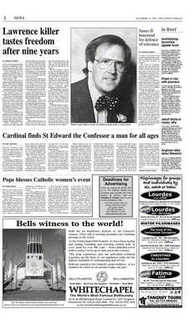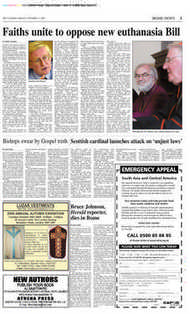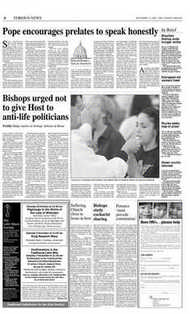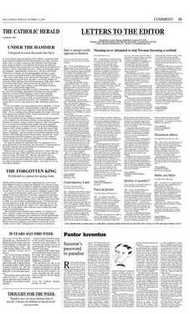Page 5, 14th October 2005
Page 5

Report an error
Noticed an error on this page?If you've noticed an error in this article please click here to report it.
Tags
Share
Related articles
Lion Of Münster To Be Beatified
Pope To Beatify ‘lion Of Münster’
Benedict Praises Holiness Of Pius Xii
The Poor Commemorated His Great Charity
Body Of Beloved Italian Pope Is Incorrupt, Says Vatican
Pope Beatifies Nazi Victims
‘Lion of Münster’ was a model Catholic, says Pope
BY DAN FRANK
A GERMAN cardinal known as the “Lion of Münster”, who spoke out against Nazi atrocities, moved a step closer to sainthood when he was beatified on Sunday in St Peter’s Basilica.
Pope Benedict XVI hailed the “heroic courage” of Clemens August von Galen, describing the cardinal as a model for those in public roles today.
Although he did not preside at the beatification, at the end of the Mass Pope Benedict entered the basilica, praying before the cardinal’s relics and greeting the thousands of pilgrims who participated in the service.
Benedict praised von Galen for dedicating himself to “defending the rights of God, of the Church, of man, which the National Socialist regime violated in a grave and systematic way, in the name of an aberrant, neo-pagan ideology”.
“Von Galen feared God more than man, and this gave him the courage to say and to do things that many intelligent persons did not do in that period in Germany,” Benedict said in his native German.
Early in his pontificate Pope Benedict signalled that he would not celebrate beatifications in order to underline the distinction between those ceremonies and canonisations, at which the Pope always presides. Sunday’s ceremony was celebrated by Cardinal Jose Saraiva Martins, who heads the Vatican’s Congregation for the Causes of Saints.
Cardinal von Galen spoke out against the Nazi campaign to exterminate the mentally ill and handicapped, and Cardinal Saraiva Martins praised the bishop for denouncing the Nazi’s euthanasia programme.
Cardinal von Galen’s homilies “invite us who live in times apparently less threatening, but not less problematic for human life, to imitate his example”, Cardinal Saraiva Martins said.
Later, before the weekly Angelus, Pope Benedict called Cardinal von Galen a “fearless opponent of the Nazi regime”.
“In the name of God he denounced the neo-pagan ideology of National Socialism, defending the freedom of the Church and gravely violated human rights, protecting Jews and the most vulnerable people, who the regime considered as rejects to be eliminated,” he said.
“This is precisely what the timeless message of the Blessed Von Galen is: faith is not to be reduced to a private sentiment, possibly to be hidden when it becomes uncomfortable; rather it implies consistency and bearing witness in the public sphere in defence of mankind, of justice, of truth.” Although the Church continuing to face criticism for alleged silence and inaction during the Second World War, Cardinal von Galen is a powerful example of the many Catholics who made a principled stand against the Nazis. Ordained a priest in 1904, he became Bishop of Munster in 1933.
He used his homilies to attack Nazi policies and, in 1941, exposed Hitler’s covert euthanasia programme. He told his congregation: “If we even once accept the principle of the right to kill our nonproductive brothers — even if it is limited from the start to the poor and defenceless mentally ill — then by this principle murder becomes admissible for all non-productive beings: the incurably ill, those made invalid at work or in war, and ourselves, when are old, weak and not so productive.
“It is impossible to imagine the abysses of moral depravity and general mistrust ... to which we would descend if such a horrible doctrine were tolerated, accepted and put into practice.” Three of his homilies from 1941 were deemed so potentially damaging to German morale that they were turned into pamphlets and airdropped over Germany by the Royal Air Force as propaganda.
In response, the Nazis deported 37 priests to concentration camps, 10 of whom died. Bishop von Galen, however, avoided arrest as the Nazis feared that his arrest or execution could lead to an uprising. Miraculously, Bishop von Galen survived the war, and in February 1946 was made a cardinal. He died barely a month later, aged 68.
blog comments powered by Disqus

















